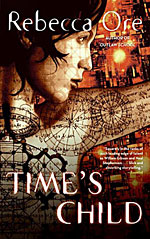
![]() charlesdee
charlesdee
2/24/2013
![]()
Earth in the early 24th century is pulling itself back together after centuries of plagues that started sometime in the 21st century. (Uh-oh. That's now.) The reduced population of North America has created a nation of city states, and Ore centers her book on Philadelphia. Why is there something inherently both funny and boring about Philadelphia? She introduces us to the Archive, a group in charge of using a time machine, a contraption that has fortuitously arrived from some future time to gather people from the past. The one caveat is that these people must have been on the verge of disappearing when the Archivists scoop them up. In other words, you can't just grab Abraham Lincoln or Julius Caesar or Jane Austen. The archivists' most recent additions are Benedetta, a 15th century peasant who happened to know Leonardo da Vinci; Ivar, a Viking teenager who fell overboard on a boat trip to Iceland; and Jonah, an alcoholic, 21st century computer troll from a good Philadelphia family who passed out drunk in the snow and would have frozen to death.
Most of those the archivists bring up-time either die of diseases they lack immunities to or go insane. But these three are real survivors. Jonah, ever the troll, helps Benedetta escape the archive just for the fun of making trouble. City states are a natural institution for her, and she becomes active in Philadelphia politics. Ivar, like any teenager, takes quickly to new technology and is soon able to reverse engineer time machines and start his own retrieval service. And Jonah is always on hand to cause trouble. He is either convinced or just wants to convince others that everyone is a subprogram in a computer game. What seems more likely is that all these characters and those they interact with are being used by the future to create the version of the future those particular future beings want. These future beings appear periodically as blue blobs that can provide some handy contraband or put a stop to a dangerous situation.
Most reader reviews complain that Ore's novel sets up great characters and this unique world and then does nothing with it. I felt what she was establishing was that those who survive remarkable times, whether earthly plagues or the dislocations of time travel, are likely to do what it takes to make life livable again. That doesn't make for a lot of exciting plot developments, but the characters are engaging to spend time with as they settle into their new roles.
Here's Benedetta having it out with Jonah, who really is a prick.
"It's the future, Jonah. We're all getting beyond what we thought we remember from before. Memory is treacherous sometimes. People are happy to be alive, to have another chance in a different world. Food in their bellies. Sex that doesn't give them clap or the pox or get them hanged. Babies to hug tht live beyond their first year."
The elitists at the Archive worry about bringing in an underclass, or that the Chinese will use their Ivar-provided time machine to repopulate with a billion of their own kind. But in the United States the sparse population and inter-marriage have resulted in a near disappearance of races. Same sex couples are also common and even bear their own children. (The biology involved here is never explained.) The new arrivals from the past are bringing genetic diversity, more food options, and a livelier social life.
But Ore is not writing a utopian novel. We never learn just what those blue blobs from the future really want, and Ivar, now living with Benedetta and soon to be a father, harbors his own doubts about the future.
...The universe proved to be a cold place with small temporary lumps of fusion reactions circled by planets too hot or too cold for life. The one known exception existed in bubbles of alternatives that actions and even thoughts pricked into nonexistence...Human futures were boxed possibilities that events obliterated or released. Everyone who wasn't obliterated by a time change died anyway.
Carpe diem.
http://www.potatoweather.blogspot.com